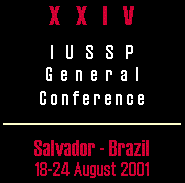|
|
Демография Центральной
и Восточной Европы на Всеобщем конгрессе по народонаселению в Бразилии
 |
Продолжается подготовка к XXIV
Всеобщему Конгрессу по народонаселению Международного Союза
по научному изучению населения (IUSSP), который состоится
в бразильском городе Сальвадор (штат Багия) 18-24 августа
2001 года.
Одна из 67 секций Конгресса посвящена демографии Центральной
и Восточной Европы.
Организатор секции - Анатолий Вишневский (Россия).
|
15 декабря 2000 года истек срок представления заявок
на участие в Конгрессе и резюме готовящихся докладов.
Ниже приводится список докладов, заявленных на секцию 44:
"Демография Центральной и Восточной Европы"
Sofija Adzic (Yugoslavia). Regional policy and managing
demographic flows - the case of the federal republic of Yugoslavia
Evgueni Andreev (Russia). Did the economic crisis cause
the mortality fluctuation in Russia in the 1990s?
Valentina Bodrova (Russia). Reproductive Orientation of
Russian Population as a Barometer of Socio-Economic Processes
during 1991-2000.
Florina Serbanescu, Howard Goldberg, Leo Morris (USA).
CDC-assisted Reproductive Health Surveys in Eastern Europe: Highlights
and Policy Implications
Tomas Frejka (USA), Ward Kingkade (USA), Kalev Katus (Estonia),
Gerard Calot (France). Contemporary cohort reproductive patterns
in the Baltic countries.
Vasile Ghetau (Romania). La fecondite et la mortalite roumaine
sous le choc de la transition economique et sociale.
Ward Kingkade and Cheryl Chriss Sawyer (USA). Infant Mortality
in Eastern Europe and the Former Soviet Union before and after
the Breakup
Dimiter Philipov (Germany). Demographic change in Central
and Eastern Europe: culture, economy, and social norms in transition.
Sergei Pirozhkov (Ukraine) and Gaiane Safarova (Russia).
Demographic perspectives of Russia and Ukraine.
Jean-Paul Sardon (France). Fecondite et transition en Europe
centrale et orientale.
Vladislava Stankuniene (Lithuania). A changing of Lithuanian
family through the 20th century.
Zhanna Zayonchkovskaya (Russia). The Postsoviet space:
the migratory situation on the eve of the 21st century.
|

![]()
![]()
